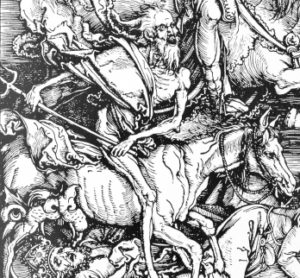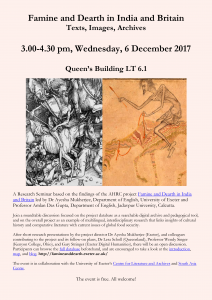Last term, we were lucky enough to be able to attend a seminar on a database resource that our team created.
Famine and Dearth text archive

Death: Detail from Four Horsemen of the Apocalypse, Albrecht Durer (1471-1528). Woodcut print, 392×282 mm 1498.
Credit: Shutterstock
As part of the Famine and Dearth project, we produced a text archive of over 750 texts from India and Britain, in languages such as English, Bengali, and Persian, and with English translations for key texts. In addition, we produced an interactive map of a merchant’s journey through India during a time of famine, chronicling his emotional reactions to the conditions of dearth or plenty he encountered.
We have tried to make these texts as discoverable and accessible as possible, by giving the user several different ways in to the texts. As well as being able to search across all of them, the user has the option to browse them by terms such as title or author, as well as tagclouds of keywords, dates, year, and languages, and by the genres that we have sorted them into. Some of these aspects can also be used in combination to filter texts in the advanced search.
This gives the user a way in when they first come to the archive. As Tom Scott, Head of Digital Engagement at the Wellcome Trust, writes, “Modern library systems present users with a search box but very little information to help them understand what they can search for”. Search only works if you know what you’re looking for. If you don’t know the scope of an archive, a blank search box can be a difficult place for a user to start. Providing an overarching view of the structure of the archive and what’s within it makes things a bit easier for the user.
The Famine and Dearth seminar
After an introduction to the database by Dr Ayesha Mukherjee from the University of Exeter and Gary Stringer from the Exeter Digital Humanities team, Dr Lesa Scholl from The University of Queensland, Australia, and Professor Wendy Singer from Kenyon College, Ohio, shared their experiences of using the database. Dr Scholl’s research concentrated on reports of weather and climate in the texts, looking especially at the evolution of words used to describe extreme weather and how they have changed since the Early Modern period. Professor Singer’s research concentrated on tracing peasants and working conditions in Early Modern texts, trying to address the problem that peasants are often not visible in the written record, as they were not able to read and write to leave their legacy.
We heard about some of the challenges they encountered using the database, such as searching for words in American spelling without realising that they might also be present in British spelling (e.g. labor/labour), and how searching for the Persian word for peasant (‘raiyat’ or ‘ryot’) brought up results for the word ‘riot’ too, a word with similar spelling but a different meaning.
We also heard about some of the features that they found useful in the database, such as being able to easily find the provenance of the original documents, seeing where the page ended in the original printed text, and being able to gloss the introductions as a quick indication of whether a particular text would be useful to them or not.
Gary Stringer from the Digital Humanities team explained how to use a tilde symbol (~) at the end of a word to turn the search into a fuzzy search, which returns slight alterations in spellings to expand the number of search results. This is particularly useful for finding the many and varied Early Modern alternative spellings of words.
We had an interesting discussion at the end of the seminar about conventions for citing digital resources and the importance of doing so. Current research shows that when people use digital resources, they are likely to cite the print version over the digital version, even if they did not use it. This trend feeds into a vicious cycle of digital resources not receiving the same prestige and recognition as printed resources, and hides the real extent of their use. We discussed how perhaps a lack of accepted conventions in citing digital resources can also contribute to these citation practices.
It was fantastic to see the database being used in research and teaching, particularly for those of us who worked on the project, and we look forward to seeing more uses for it in the future.
Have a browse through the texts yourself, and see what you can find: famineanddearth.exeter.ac.uk
Hannah Petrie, Digital Humanities Documentation and Archives Administrator

